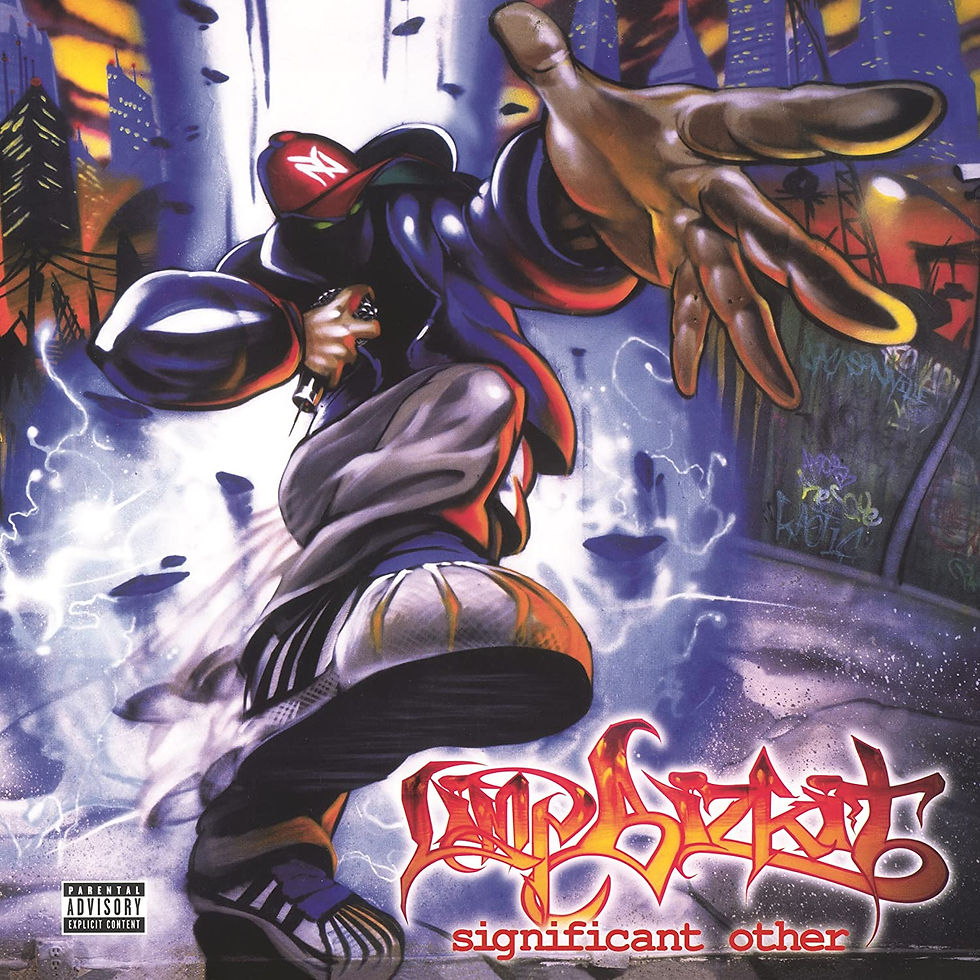Limp Bizkit - Significant Other
- FaceOff - עימות חזיתי

- Jun 22, 2025
- 4 min read
The second studio album "Significant Other" by "Limp Bizkit", was released on June 22, 1999.
This is one of the top Nu-Metal explosions accrued at the beginning of 2000. A crazy red-capped singer with a heavy guitar player, heavy beats drummer and bassist accompanied by a "lethal" DJ dropped their music on the world.

Their debut album, "Three Dollar Bill, Y'all," released in 1997, didn't create much buzz or attention for the emerging group, despite their close association with "Korn" and their involvement in the Nu-Metal movement. However, there was one song on the album that stood out amidst the sea of mediocrity. Their cover of George Michael's "Faith" quickly gained momentum, receiving extensive airplay on radio stations, clubs, and becoming a massive hit on MTV.
After this breakthrough, "Limp Bizkit" became a household name, and the anticipation for their next album reached a fever pitch. On one hand, expectations were high, but on the other hand, many believed that the band was destined to be a "one hit wonder." People anticipated a lackluster album since nothing else from their first album had resonated with audiences except for "Faith."
However, these doubts only fueled Fred and his friends to create their best-selling album. "Limp Bizkit" aspired to be rock stars, longing for fame and success. They were determined to turn their dreams into reality. The band aimed to combine strong heavy metal riffs with hip-hop, powerful beats, and effects. Following the success of the renowned "Family Values Tour" organized by "Korn," Bizkit was eager to hit the recording studio. Despite their label's advice to take a break, they enlisted producer Terry Date, known for his work with "Pantera," "White Zombie," and "Deftones," to enhance their sound and dive into the studio.
The album's creativity, as the spirit of the band, was led by the two characters...

Fred Durst had a turbulent upbringing, often feeling like an outsider and seeking solace in alternative music. Rebelling against authority, he made a surprising decision to join the army but soon dropped out, finding himself homeless and living on the streets. Recognizing his strengths as a vocal and relatable figure with a pouty, angsty demeanor, he knew he would fit perfectly in a high school detention hall anywhere in the Western world. With this in mind, he formed the band around those qualities.
On the flip side, there was another significant figure in the band who embodied a completely different persona. This individual was a flamboyant and eccentric individual, often donning body paint and wearing black eye contacts. Despite this striking appearance, they possessed the intelligence and creative vision that drove the band's success.

Wes Borland, the creative force behind the band, bore the weight of crafting their music and carrying the artistic burden. Growing up in Nashville, Tennessee, he faced the challenge of not succumbing to the influence of country music and eventually found his musical calling when he relocated to Jacksonville. Wes served as the mastermind behind the band's melodies and overall sound, skillfully blending elements from various genres of rock music. His powerful riffs provided the necessary backbone to support the frontman's at times outrageous and absurd lyrics. Without Wes's instrumental contributions, which evoked the sensation of one's face being slammed into a windshield with the relentless force of countless car wrecks, the lyrical content would not have resonated as effectively. Furthermore, Wes was renowned for his extravagant stage presence, taking charge of all the costumes and makeup preparations himself.
While acknowledging the contributions of drummer John Otto, turntablist DJ Lethal, and bassist Sam Rivers, it was the symbiotic relationship between Wes and Fred that kept things running smoothly for the band. This synergy became evident during Wes's temporary departure from the group, but fortunately, he eventually returned, ensuring the band's continued success.

Led by these two charismatic individuals, the band found themselves at the forefront of the musical revolution of 2000. They took the well-known formula of sludgy, loud-quiet-loud dynamics popularized by Nirvana, infused it with infectious hip-hop beats, and added a touch of raw, confrontational lyrics addressing disloyal friends, lovers, and sprinkled with provocative sexual and crude humor.
Setting the tone for their album, they kicked things off with the opening line, "You wanted the worst, you got the worst."
As the summer vacation approached and teenagers eagerly anticipated their break, on June 16, 1999, "Nookie" was released as the first single from the album. Inspired by Fred's own breakup with his girlfriend, the song was a potent blend of sexy and powerful rap-rock hybrid. It struck a chord with the overwhelmed and hormone-fueled bodies of young, wild teenagers, delivering exactly what they were craving. There's no need to feel embarrassed; it resonated with you too!
Six days later the album came out and sold 643,874 copies in its first week. In its second week of release, the album sold an additional 335,000 copies. Very quickly it reached the top and conquered the number-one spot on the Billboard 200 chart.
The band collaborated with "Korn" vocalist Jonathan Davis and Scott Weiland of "Stone Temple Pilots" on "Nobody Like You". Weiland would frequently visit NRG studios and help Fred with the vocals.
"Staind" singer Aaron Lewis provided backup vocals on the song "No Sex", while Scott Borland, Wes' brother, played keyboards on "Just Like This", "Nookie", "Re-Arranged", "I'm Broke", "9 Teen 90 Nine" and "A Lesson Learned". The band allowed Durst and DJ Lethal to explore their hip hop influences by recording with Method Man. DJ Premier of Gang Starr was brought in to produce the collaboration on the song "N 2 Gether Now".
Listen to the album on: Spotify, Apple Music.












Comments